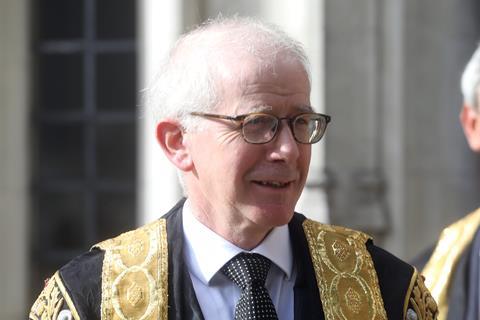The president of the Supreme Court has denied that judges have over-extended their reach. Appearing before the House of Lords Constitution Committee today, Reed also spoke of the ‘irresponsible’ coverage of court decisions from sections of the media and rejected calls for Supreme Court hopefuls to face a confirmation hearing from politicians ahead of their appointment.
Reed said from the outset that the relationship between parliament and court was ‘something that needs to be addressed’ and that ties with the House of Commons were ‘extremely limited’. On criticism since the prorogation case last year that judges had exceeded their brief, Reed said this reflected the wishes of parliament rather than any power trip.
‘We don’t make it up as we go along,’ he said. ‘It is certainly true a great many things we look at now might not have been looked at by judges 100 years ago or even 50 years ago. To some extent it is because government was not doing these things 100 or 50 years ago.
‘It is also because parliament has enacted a lot of laws, notably the Human Rights Act and the European Communities Act, which have given the courts the duty of enforcing laws which relate to a political and constitutional culture which is not the traditional British constitutional culture.’

Reed was pressed on Boris Johnson’s proposals for a constitutional commission to examine the role of judicial review challenges. He pointed out the Court of Appeal and divisional courts have ruled in the past year that judicial review was not to be regarded as politics by another means.
Reed added: ‘Judges are very well aware of the risk of challenges being brought in what are political rather than legal grounds. They are repelling them and are careful to avoid straying into what are genuine political matters. When this is a matter that is to be considered it should not start from the premise that judges are eager to pronounce on political issues. The true position is actually quite the opposite.’
Reed was sceptical of calls from some quarters for judges wanting to move to the Supreme Court to face scrutiny from parliament. Suggestions have ranged from confirmation hearings staffed by politicians to a system closer to the US system where appointments can be vetoed.
‘I would not welcome [confirmation hearings],’ said Reed. ‘They are not going to ask me ‘do I like cats’ or how do I like to spend the weekend. What politicians are interested in is politics. It is premised on a misunderstanding of what we do.
‘We are lawyers and I can’t deny our personality plays a part but we agonise sometimes over trying to get the right legal answer. In the first Miller case I held in favour of the government. In the second [Brexit-related] case I held against the government. I had not suddenly switched from being a Brexiter to a Remainer – it was based on the legal merits of the case.’
The Supreme Court judgment on the prorogation case raised the scrutiny of its workings, and Reed admitted he had been met by reporters and photographers on his doorstep in the past. He stressed the media coverage was actually largely balanced and in some cases complimentary of the court’s work, but was concerned at how criticism was affecting public trust.
‘The media doesn’t affect our decisions [but] it is sometimes irresponsible. It is one thing to criticise us. In our court, cases don’t reach us unless they are difficult and we can take it for granted there are going to be mixed responses to our decisions. What is irresponsible is attacks on our integrity. For example asserting that our decisions are based on political bias in favour of one side.’



























18 Readers' comments